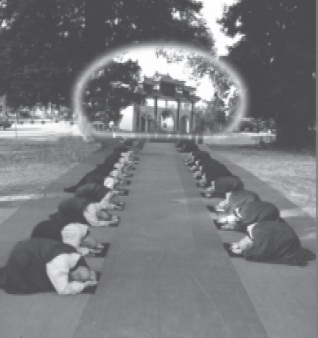|
音法師答:寺院生活非常單純,沒有那麼多外漏,雖然在萬佛城裡有學校,會有學生跑來跑去的,日子還是相當平靜的。我所做的工作,使我感覺很充實。任何只要為佛教而做的事,都比我以前那份令我苦惱的電腦軟體公司的工作,使我覺得充實快樂。
實法師答:一層一層不停地剝掉。出家就是卸下和縮減,教你除去一層又一層的覆蓋、煩惱、無知、執著、欲求、妄念、概念和偏見。你通通把它們剝掉了。出家就是在密切的群居生活中,你可以不跟旁人說話,可是大家仍然有修道的默契。
問:師父(宣公上人)不在以後,情況如何?
實法師答:有人說他沒走。有人夢見過他。每當我特別專注的時候,就會有一陣非常奇妙的風吹過來,挺好玩的。師父常常出人意料。
每個接近師父的人都會有一些令人驚歎的故事。雖然師父明確地表示過不願談論神通的事。他以無止盡的不自私,把心給人。有一則關於師父披著紅袈裟在我們後面禮拜的故事,我本人沒看見,是高速公路的巡邏員看到的。很多人都會有像這樣的故事。
持法師答:我認為師父早就知道他的肉體有病了,所以他把最後的十年花在體系的安排,以及這些系統日後如何有效的運作上面。因為過去所見,因此他很注意錢的事,他費許多精力教導我們怎樣以一種如法的方式來處理這事。他也建立了學校和僧伽訓練系統。他把我們派出去,可是他會不時用電話和我們聯絡,直到你到了該去的地方,瞭解那究竟是什麼為止。
他的離去對整個總會來說是最大的衝擊。冷眼旁觀的人,以為我們會垮,不能走下去了,其實上人的德行、努力、遠見和無私的奉獻,直到現在仍支持著我們持續不停地前進。
問:僧團的生活對你有何幫助?
良法師答:加入我們這個團體,即表示你可以是這個團體的一部份,可是卻沒有什麼規定。不過倒有一件事,為了修行你得酌量放棄自我。僧團,能幫你不至於迷失而走到危險的歧路上去。
實法師答:僧人有一缽三衣,而且你不可以任意改變僧袍的顏色,那使你看來就好像你前面的那個人似的,你們簡直一模一樣。僧團是一種很好的體系,它沒有空間容納你的自我和保留你的小脾氣。你可以完全地輕鬆,外在的一切,隨他去。
問:如何使我們保持出家身而不退轉呢?
良法師答:我認為要能通得過考驗。
實法師答:這可能跟以前發的願有關。天天、時時刻刻、念念都在發出家而不退轉的願。
持法師答:我認為退心是來自僧團的外在壓力,或者是來自個人內在的壓力吧。我常使用一種辦法,我會告訴自己:「好吧,我在日曆上做個記號,從現在起的一年後,我再考慮這件事,然後看看事情的發展。」如果在這一年之後,我還在考慮這件事的話,那我就該做個決定了。結果呢,我不是一年後根本忘了那件事,就是發現這些事看起來已經不像早先那樣嚴重了,或是回頭看看這些事是怎麼得到解決的。這是我用的一個辦法。
實法師答:要多拜佛。
問:你們如何守持戒律呢?
持法師答:我們一個月要背誦戒律兩次。許多小戒律給歸成五大類。學習戒律的時候,我們會作圖表,以觀察這些戒律是如何從同一種行為中衍生出來的。在你犯規的時候,我們僧團也會提醒你。我們用開會來彼此檢討,有些會議也有在家人參加,目的在使四眾保持和諧。
實法師答:戒律是解脫,而不是限制。
問:誰來關照你們的健康?有沒有醫生?有沒有健康保險?
持法師答:信眾會捐款到我們的醫療基金。 有義診的醫師定期來給我們作免費醫療,我們也可以去醫師那裡看病。如果要作檢驗,這是我們唯一要付的費用。
良法師答:至今我們還沒有找到一個能夠讓每個人都滿意的醫療保險,因為大家喜歡的醫療方式不同。
(全文完)
|
|
A: DM Yin: Monastic life is really focused, so there aren’t so many outflows. Even in our schools at the City of Ten Thousand Buddhas with children running around, it is still really peaceful. I feel very fulfilled by the work I do. Just doing any kind of work for Buddhism is much more fulfilling than when I was working for a computer software company—that made me very afflicted. Now I just feel a lot of joy.
A: DM Sure: It is peeling off another layer. You leave home by getting rid of, by subtraction. You get rid of layers and layers of covering, affliction, ignorance, attachment, desire, false thoughts, concepts, and prejudices, one by one by one. You peel them away. Leaving home is intensely social. You enter a community, and you can go through days where you don’t talk to the person next to you, but there is a bonding [in cultivation].
Q: What is it like without Shr Fu (Venerable Master Hua)?
A: DM Sure: Some say he is not gone. Some have dreams of him. When I am feeling especially mindful, there is a very interesting wind blowing, but it is very funny. The Abbot is very amazing.
Every single person who was near to the Abbot had these amazing stories. The Abbot was very clear about not talking about psychic powers. With infinite selflessness, he gave heart to people. There was a story of the Abbot bowing behind us in the red robe (Three Steps, One Bow). I didn’t see that, but the highway patrol did. Many people have stories like that.
A: DM Chih: I think he knew early on that he had some physical illness. He spent the last decade arranging the systems, and how they would function. He was very conscious of money, because of what he had seen in the past. So he spent a lot of energy teaching us how to handle that in a proper monastic way. He also set up the schools and the training system. He would send us to our “home away” from him, and he would stay in touch with us by being on the phone all the time until we got into our groove, and understood whatever it was.
His leaving was climactic for the whole association. People watched us and figured that we would fall and wouldn’t carry on. But his virtue, hard work, foresight, and dedication allowed us to continue.
Q: How does the regimentation in monastic life help you?
A: DM Liang: Part of joining the community is that you can be a part of the community. However, there is a certain amount of self that you have to give up in order to cultivate. The regimentation sort of takes care of that. It helps to keep you from straying onto some divergent path that could be dangerous for you.
A: DM Sure: Each left-home person has one bowl and three robes. And you don’t change the color of the robe. You look just like the person in front of you—really the same. It is a wonderful system because there is no room for your ego to assert your own little individuality. You can totally relax and let the external go.
Q: How do you survive over the years and not return to lay-life?
A: DM Liang: I think we were able to pass the test.
A: DM Sure: It may have something to do with past vows. It goes from day to day, minute to minute, thought to thought.
A: DM Chih: There are external pressures within the community (or which I perceive), or my internal pressures. I usually use an expedient. I say, “Well, I’ll think about that a year from now and mark it on my calendar, then see how it goes.” If I am still thinking about it a year from now, then I’ll decide. It usually turns out that I forget the anniversary, or I laugh at how big it seemed when it wasn’t really big. Or I would be interested in how it got resolved. So that is a simple technique that I use.
A: DM Sure: Bow a lot.

Q: How do you keep track of all your precepts?
A: DM Chih: We recite them twice a month. A lot of the smaller ones are layered into the five big categories. When we study them, we will make charts and see how they are variations of the same behavior pattern. Also, the community reminds you when you step out of line. We have meetings with each other to examine these. These meetings can also involve the lay people. The idea is to help us remain harmonious.
A: DM Sure: Precepts are liberations, not limitations.
Q: Who takes care of your health? Do you have a doctor? Health insurance?
A: DM Chih: People donate into our medical fund. Voluntary doctors come regularly on a monthly basis to treat us and we can also go to them in between their visits. The only thing we pay for are tests.
A: DM Liang: We have not found one medical plan that fits everyone’s preferences because different people prefer different treatments.
(The End)
|